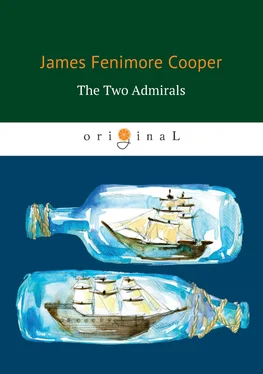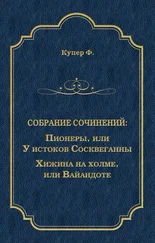Джеймс Фенимор Купер - The Two Admirals
Здесь есть возможность читать онлайн «Джеймс Фенимор Купер - The Two Admirals» — ознакомительный отрывок электронной книги совершенно бесплатно, а после прочтения отрывка купить полную версию. В некоторых случаях можно слушать аудио, скачать через торрент в формате fb2 и присутствует краткое содержание. Город: Москва, Год выпуска: 2018, ISBN: 2018, Жанр: Исторические приключения, Прочие приключения, literature_19, Морские приключения, на английском языке. Описание произведения, (предисловие) а так же отзывы посетителей доступны на портале библиотеки ЛибКат.
- Название:The Two Admirals
- Автор:
- Жанр:
- Год:2018
- Город:Москва
- ISBN:978-5-521-06651-3
- Рейтинг книги:3 / 5. Голосов: 1
-
Избранное:Добавить в избранное
- Отзывы:
-
Ваша оценка:
- 60
- 1
- 2
- 3
- 4
- 5
The Two Admirals: краткое содержание, описание и аннотация
Предлагаем к чтению аннотацию, описание, краткое содержание или предисловие (зависит от того, что написал сам автор книги «The Two Admirals»). Если вы не нашли необходимую информацию о книге — напишите в комментариях, мы постараемся отыскать её.
The Deerslayer
The Two Admirals — читать онлайн ознакомительный отрывок
Ниже представлен текст книги, разбитый по страницам. Система сохранения места последней прочитанной страницы, позволяет с удобством читать онлайн бесплатно книгу «The Two Admirals», без необходимости каждый раз заново искать на чём Вы остановились. Поставьте закладку, и сможете в любой момент перейти на страницу, на которой закончили чтение.
Интервал:
Закладка:
Mrs. Dutton asked her host’s permission to retire, with her daughter, at the earliest moment permitted by propriety. In quitting the room she cast an anxious glance at the face of her husband, which was already becoming flushed with his frequent applications of port; and spite of an effort to look smiling and cheerful, her lips quivered, and by the time she and Mildred reached the drawing-room, tears were fast falling down her cheeks. No explanation was asked, or needed, by the daughter, who threw herself into her mother’s arms, and for several minutes they wept together, in silence. Never had Mrs. Dutton spoken, even to Mildred, of the besetting and degrading vice of her husband; but it had been impossible to conceal its painful consequences from the world; much less from one who lived in the bosom of her family. On that failing which the wife treated so tenderly, the daughter of course could not touch; but the silent communion of tears had got to be so sweet to both, that, within the last year, it was of very frequent occurrence.
“Really, Mildred,” said the mother, at length, after having succeeded in suppressing her emotion, and in drying her eyes, while she smiled fondly in the face of the lovely and affectionate girl; “this Admiral Bluewater is getting to be so particular, I hardly know how to treat the matter.”
“Oh! mother, he is a delightful old gentleman! and he is so gentle, while he is so frank, that he wins your confidence almost before you know it. I wonder if he could have been serious in what he said about the noble daring and noble deserving of Prince Edward!”
“That must pass for trifling, of course; the ministry would scarcely employ any but a true whig, in command of a fleet. I saw several of his family, when a girl, and have always heard them spoken of with esteem and respect. Lord Bluewater, this gentleman’s cousin, was very intimate with the present Lord Wilmeter, and was often at the castle. I remember to have heard that he had a disappointment in love, when quite a young man, and that he has ever since been considered a confirmed bachelor. So you will take heed, my love.”
“The warning was unnecessary, dear mother,” returned Mildred, laughing; “I could dote on the admiral as a father, but must be excused from considering him young enough for a nearer tie.”
“And yet he has the much admired profession, Mildred,” said the mother, smiling fondly, and yet a little archly. “I have often heard you speak of your passion for the sea.”
“That was formerly, mother, when I spoke as a sailor’s daughter, and as girls are apt to speak, without much reflection. I do not know that I think better of a seaman’s profession, now, than I do of any other. I fear there is often much misery in store for soldiers’ and sailors’ wives.”
Mrs. Dutton’s lip quivered again; but hearing a foot at the door, she made an effort to be composed, just as Admiral Blue-water entered.
“I have run away from the bottle, Mrs. Dutton, to join you and your fair daughter, as I would run from an enemy of twice my force,” he said, giving each lady a hand, in a manner so friendly, as to render the act more than gracious; for it was kind. “Oakes is bowsing out his jib with his brother baronet, as we sailors say, and I have hauled out of the line, without a signal.”
“I hope Sir Gervaise Oakes does not consider it necessary to drink more wine than is good for the mind and body,” observed Mrs. Dutton, with a haste that she immediately regretted.
“Not he. Gervaise Oakes is as discreet a man, in all that relates to the table, as an anchorite; and yet he has a faculty of seeming to drink, that makes him a boon companion for a four-bottle man. How the deuce he does it, is more than I can tell you; but he does it so well, that he does not more thoroughly get the better of the king’s enemies, on the high seas, than he floors his friends under the table. Sir Wycherly has begun his libations in honour of the house of Hanover, and they will be likely to make a long sitting.”
Mrs. Dutton sighed, and walked away to a window, to conceal the paleness of her cheeks. Admiral Bluewater, though perfectly abstemious himself, regarded license with the bottle after dinner, like most men of that age, as a very venial weakness, and he quietly took a seat by the side of Mildred, and began to converse.
“I hope, young lady, as a sailor’s child, you feel an hereditary indulgence for a seaman’s gossip,” he said. “We, who are so much shut up in our ships, have a poverty of ideas on most subjects; and as to always talking of the winds and waves, that would fatigue even a poet.”
“As a sailor’s daughter, I honour my father’s calling, sir; and as an English girl, I venerate the brave defenders of the island. Nor do I know that seamen have less to say, than other men.”
“I am glad to hear you confess this, for – shall I be frank with you, and take a liberty that would better become a friend of a dozen years, than an acquaintance of a day; – and, yet, I know not why it is so, my dear child, but I feel as if I had long known you, though I am certain we never met before.”
“Perhaps, sir, it is an omen that we are long to know each other, in future,” said Mildred, with the winning confidence of unsuspecting and innocent girlhood. “I hope you will use no reserve.”
“Well, then, at the risk of making a sad blunder, I will just say, that ‘my nephew Tom’ is any thing but a prepossessing youth; and that I hope all eyes regard him exactly as he appears to a sailor of fifty-five.”
“I cannot answer for more than those of a girl of nineteen, Admiral Bluewater,” said Mildred, laughing; “but, for her, I think I may say that she does not look on him as either an Adonis, or a Crichton.”
“Upon my soul! I am right glad to hear this, for the fellow has accidental advantages enough to render him formidable. He is the heir to the baronetcy, and this estate, I believe?”
“I presume he is. Sir Wycherly has no other nephew – or at least this is the eldest of three brothers, I am told – and, being childless himself, it must be so. My father tells me Sir Wycherly speaks of Mr. Thomas Wychecombe as his future heir.”
“Your father! – Ay, fathers look on these matters with eyes very different from their daughters!”
“There is one thing about seamen that renders them at least safe acquaintances,” said Mildred, smiling; “I mean their frankness.”
“That is a failing of mine, as I have heard. But you will pardon an indiscretion that arises in the interest I feel in yourself. The eldest of three brothers – is the lieutenant, then, a younger son?”
“ He does not belong to the family at all, I believe,” Mildred answered, colouring slightly, in spite of a resolute determination to appear unconcerned. “Mr. Wycherly Wychecombe is no relative of our host, I hear; though he bears both of his names. He is from the colonies; born in Virginia.”
“ He is a noble, and a noble-looking fellow! Were I the baronet, I would break the entail, rather than the acres should go to that sinister-looking nephew, and bestow them on the namesake. From Virginia, and not even a relative, at all?”
“That is what Mr. Thomas Wychecombe says; and even Sir Wycherly confirms it. I have never heard Mr. Wycherly Wychecombe speak on the subject, himself.”
“A weakness of poor human nature! The lad finds an honourable, ancient, and affluent family here, and has not the courage to declare his want of affinity to it; happening to bear the same name.”
Mildred hesitated about replying; but a generous feeling got the better of her diffidence. “I have never seen any thing in the conduct of Mr. Wycherly Wychecombe to induce me to think that he feels any such weakness,” she said, earnestly. “He seems rather to take pride in, than to feel ashamed of, his being a colonial; and you know, we, in England, hardly look on the people of the colonies as our equals.”
Читать дальшеИнтервал:
Закладка:
Похожие книги на «The Two Admirals»
Представляем Вашему вниманию похожие книги на «The Two Admirals» списком для выбора. Мы отобрали схожую по названию и смыслу литературу в надежде предоставить читателям больше вариантов отыскать новые, интересные, ещё непрочитанные произведения.
Обсуждение, отзывы о книге «The Two Admirals» и просто собственные мнения читателей. Оставьте ваши комментарии, напишите, что Вы думаете о произведении, его смысле или главных героях. Укажите что конкретно понравилось, а что нет, и почему Вы так считаете.












